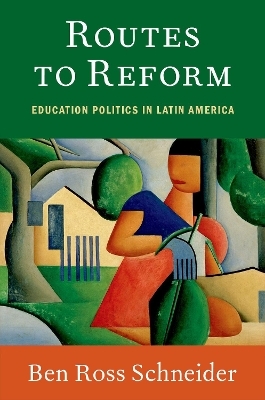
Routes to Reform
Oxford University Press Inc (Verlag)
978-0-19-775886-1 (ISBN)
The key to sustained and equitable development in Latin America is high quality education for all. However, coalitions favoring quality reforms in education are usually weak because parents are dispersed, business is not interested, and much of the middle class has exited public education. In Routes to Reform, Ben Ross Schneider examines education policy throughout Latin America to show that reforms to improve learning--especially making teacher careers more meritocratic and less political--are possible. Several Andean countries and state governments in Brazil achieved notable reform since 2000, though on markedly different trajectories. Although rare, the first bottom-up route to reform was electoral. The second route was more top-down and technocratic, with little support from voters or civil society. Ultimately, by framing education policy in a much broader comparative perspective, Schneider demonstrates that contrary to much established theory, reform outcomes in Latin America depended less on institutions and broad coalitions, but rather--due to the emptiness of the education policy space--on more micro factors like civil society organizations, teacher unions, policy networks, and technocrats.
Ben Ross Schneider is the Ford International Professor of Political Science and director of the MIT Chile program. Prior to joining MIT in 2008, Schneider taught at Princeton University and Northwestern University. Schneider's teaching and research interests fall within the general fields of comparative politics, political economy, and Latin American politics. His books include Business Politics and the State in 20th Century Latin America (2004), Hierarchical Capitalism in Latin America: Business, Labor, and the Challenges of Equitable Development (2013), Designing Industrial Policy in Latin America: Business-Government Relations and the New Developmentalism (2015), and New Order and Progress: Democracy and Development in Brazil (Oxford University Press, 2016). He also has published on topics such as democratization, technocracy, education politics, the developmental state, business groups, industrial policy, and comparative bureaucracy.
Preface
Part I: Theory and Arguments
1. Introduction: The Contentious Politics of Education
2. Theorizing on Education Politics: Macro to Micro
Part II: Reform Cases
3. Bottom-Up Reform in Chile: Electoral Mobilization, Policy Networks, and Civil Society
4. From Bottom-up to Top-down in Ecuador
5. Top Down Reform: Unions and Technocrats in Colombia and Peru
6.Union Blockage and Clientelist Backlash in Mexico, South Africa, Rio de Janeiro
Part III: Comparisons and Conclusions
7. Brazil: Innovating in the States
8. Parties, Coalitions, and Routes to Technical Education
9. Conclusions
Appendices (B-E online)
A. Interviews
B. Ministers of Education: Technocrats or Politicians
C. Governors and Parties in Brazil, 1999-2022
D. Protests and Demands in Education
E. Civil Society in Education
Bibliography
Index
| Erscheinungsdatum | 25.04.2024 |
|---|---|
| Zusatzinfo | 16 b/w line drawings; 6 tables |
| Verlagsort | New York |
| Sprache | englisch |
| Maße | 235 x 157 mm |
| Gewicht | 313 g |
| Themenwelt | Sozialwissenschaften ► Pädagogik |
| Sozialwissenschaften ► Politik / Verwaltung ► Europäische / Internationale Politik | |
| Sozialwissenschaften ► Politik / Verwaltung ► Vergleichende Politikwissenschaften | |
| ISBN-10 | 0-19-775886-X / 019775886X |
| ISBN-13 | 978-0-19-775886-1 / 9780197758861 |
| Zustand | Neuware |
| Haben Sie eine Frage zum Produkt? |
aus dem Bereich


